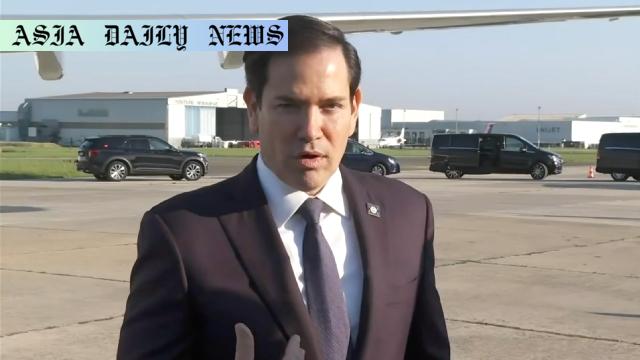Ukraine conflict: US Secretary of State Marco Rubio implies Trump administration may end mediation efforts in the coming days.
- US Secretary of State Marco Rubio suggested mediation efforts in the Ukraine conflict could halt soon.
- President Donald Trump may announce a cessation if progress isn’t visible within days.
- Talks between Russia and Ukraine lack tangible advancement.

Introduction: US Reevaluates Mediation in Ukraine Conflict
Recent statements by US Secretary of State Marco Rubio have unveiled a potential shift in the United States’ approach to mediating the ongoing war in Ukraine. Addressing reporters in Paris, Rubio indicated that the Trump administration may soon abandon its efforts to intervene, citing a lack of progress in ceasefire negotiations. The comments come amidst growing frustration over the prolonged conflict and the apparent difficulty of brokering peace between Russia and Ukraine. This development marks a critical junction in international relations, raising questions about the future trajectory of this devastating war.
Stalled Negotiations and Mounting Challenges
Despite numerous attempts at fostering dialogue between the warring nations, tangible outcomes remain elusive. According to Rubio, the mediation efforts have reached a critical juncture where prolonged engagement without results is no longer deemed viable. He emphasized the urgency of achieving progress in a matter of days, suggesting that the United States could pivot its focus away from the Ukraine conflict if no immediate headway is made. This sentiment reflects broader strategic considerations, as the US faces mounting domestic and international challenges demanding attention and resources.
The Trump Administration’s Stance
President Donald Trump’s administration has taken a pragmatic yet decisive view of foreign conflicts, prioritizing results over prolonged engagement. Rubio’s comments underscore this approach, highlighting a willingness to step back from diplomatic efforts if they fail to yield results. This strategy, however, has sparked mixed reactions. Supporters argue that it exemplifies effective resource allocation and clear prioritization, while critics warn that disengagement could embolden Russia and exacerbate the humanitarian crisis in Ukraine.
The Geopolitical Implications
Abandoning mediation efforts in Ukraine would carry significant geopolitical ramifications. Russia’s position in the region could be strengthened, potentially undermining NATO’s stance and affecting relationships with other European nations. Furthermore, it may signal a shift in US foreign policy, prompting allies to reconsider America’s commitment to addressing regional conflicts. This potential pivot aligns with Trump’s broader vision of recalibrating US foreign involvement, yet it also raises concerns about the long-term consequences of reduced engagement in global issues.
What Comes Next for Ukraine?
If the United States withdraws from mediation efforts, the burden of brokering peace will likely shift to European nations and international organizations. The European Union, in particular, may be compelled to step up its role in resolving the conflict. Simultaneously, Ukraine could face increased pressure to negotiate directly with Russia, potentially under less favorable conditions. This development underscores the precariousness of the situation and the need for a coordinated, multilateral approach to fostering peace and stability in the region.



Commentary
The Gravity of Abandoning Mediation in Ukraine
The recent remarks by US Secretary of State Marco Rubio point to a possible withdrawal of American mediation efforts in the Ukraine conflict. While such a decision might be driven by pragmatic considerations, it carries profound implications for the global political landscape. The situation demands a careful evaluation of both the immediate and long-term impacts on Ukraine’s sovereignty, regional stability, and international partnerships.
The Dilemma of Prolonged Involvement
It is clear that the Trump administration is opting for a results-driven approach to diplomacy. By emphasizing quick resolutions over indefinite mediations, this stance reflects a desire to allocate resources effectively. However, this pragmatism must be balanced against the intricate realities of conflict resolution. Wars, especially those with deep historical, political, and ideological roots, require nuanced and sustained international engagement. Abandoning mediation in the absence of progress risks leaving a vacuum that could be exploited by parties opposed to peace.
The Humanitarian and Strategic Costs
The conflict in Ukraine has claimed thousands of lives and displaced millions, creating one of the most pressing humanitarian crises of our time. A potential US withdrawal from mediation efforts could exacerbate these challenges. Moreover, it may embolden actors such as Russia to adopt more aggressive stances, further destabilizing the region. Strategically, the United States must weigh the risks of reduced engagement against the potential ripple effects on its global standing and influence.
Moving Forward: The Role of Multilateral Engagement
If the US decides to step back, a multilateral approach may provide the best path forward. European nations, NATO, and the United Nations must collaborate more closely to bring Russia and Ukraine to the negotiating table. At the same time, the US can continue to play a supportive role, offering diplomatic, financial, and logistical assistance as needed. This balanced approach allows for both pragmatism and responsibility, ensuring that the broader international community shares the burden of addressing the conflict.
Final Reflections
The Ukraine conflict represents a complex and multifaceted challenge for global diplomacy. While the prospect of the US abandoning its mediation efforts raises concerns, it also underscores the need for innovative and collaborative solutions. As the world watches closely, the actions taken in the coming days will not only influence the future of Ukraine but also shape the dynamics of international relations for years to come.